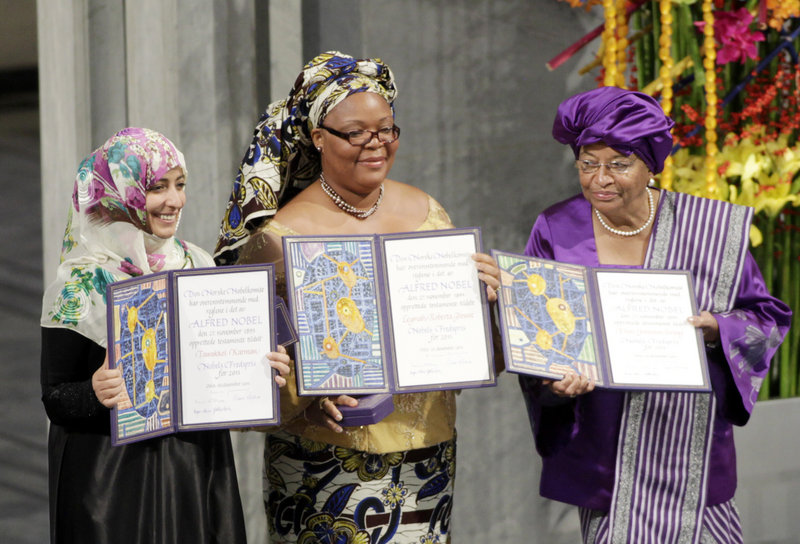OSLO, Norway – Three women who fought injustice, dictatorship and sexual violence in Liberia and Yemen accepted the 2011 Nobel Peace Prize on Saturday, calling on repressed women worldwide to rise up against male supremacy.
“My sisters, my daughters, my friends — find your voice,” Liberian President Ellen Johnson Sirleaf said after collecting her Nobel diploma and medal at a ceremony in Oslo.
Sirleaf, Africa’s first democratically elected female president, shared the award with women’s rights activist Leymah Gbowee, also from Liberia, and Tawakkol Karman, a female icon of the protest movement in Yemen.
The peace prize was announced in October, along with the Nobel awards for medicine, physics, chemistry, literature and economics. Worth $1.5 million each, the Nobel Prizes are always handed out on the anniversary of award founder Alfred Nobel’s death on Dec. 10, 1896.
By selecting Karman, the prize committee recognized the Arab Spring movement that has toppled autocratic leaders in North Africa and the Middle East. Praising Karman’s struggle against Yemen’s regime, Nobel committee chairman Thorbjoern Jagland also sent a message to Syria’s leader Bashar Assad, whose crackdown on rebels has killed more than 4,000 people according to U.N. estimates.
“President Assad in Syria will not be able to resist the people’s demand for freedom of human rights,” Jagland said.
Karman is the first Arab woman to win the prize and, at 32, the youngest peace laureate ever.
In her acceptance speech, Karman paid tribute to Arab women and their struggles “in a society dominated by the supremacy of men.”
No woman or sub-Saharan African had won the prize since 2004, when the committee honored Wangari Maathai of Kenya, who mobilized poor women to fight deforestation by planting trees.
Sirleaf, 73, was elected president of Liberia in 2005 and won re-election in October. She is widely credited with helping her country emerge from an especially brutal civil war.
The Nobel chairman noted that she initially supported Charles Taylor but later dissociated herself from the former rebel leader who is now awaiting judgment from the International Criminal Court on charges of war crimes in Sierra Leone.
Gbowee, 39, challenged Liber-ia’s warlords as she campaigned for women’s rights and against rape. In 2003, she led hundreds of female protesters through Monrovia to demand swift disarmament of fighters, who continued to prey on women, despite a peace deal.
“We used our pains, broken bodies and scarred emotions to confront the injustices and terror of our nation,” she told the audience in Oslo’s City Hall.
“We must continue to unite in sisterhood to turn our tears into triumph,” Gbowee said.
Send questions/comments to the editors.



Success. Please wait for the page to reload. If the page does not reload within 5 seconds, please refresh the page.
Enter your email and password to access comments.
Hi, to comment on stories you must . This profile is in addition to your subscription and website login.
Already have a commenting profile? .
Invalid username/password.
Please check your email to confirm and complete your registration.
Only subscribers are eligible to post comments. Please subscribe or login first for digital access. Here’s why.
Use the form below to reset your password. When you've submitted your account email, we will send an email with a reset code.